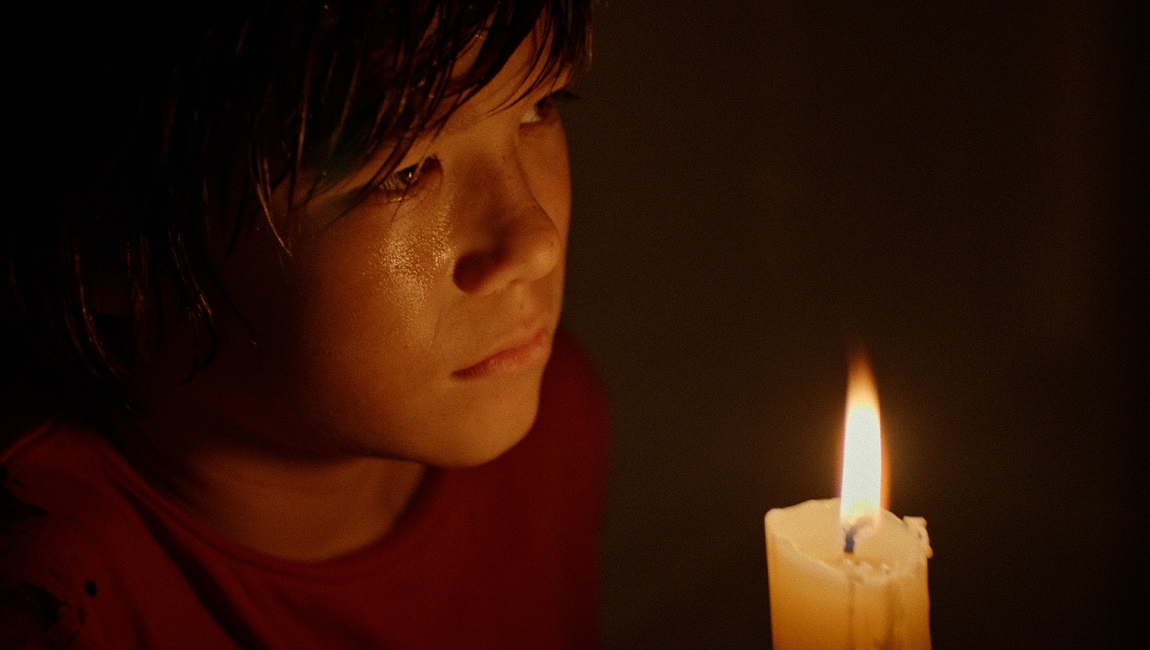The Djinn offers plenty of playful throwback chills, but boasts eye-roll messaging and doesn’t quite know who its audience is.
Anyone expecting the gore and camp of 1997’s malevolent genie pic Wishmaster will undoubtedly be disappointed by The Djinn, David Charbonier and Justin Powell’s latest take on the old adage “Be careful what you wish for.” In fact, if a comparison was to be made, The Djinn feels more in line with those ’80s Amblin flicks that scared the shit out of pre-pubescents everywhere, with the PG-rated jolts of Poltergeist and Gremlins proving more than most children — and more than a few adults — could handle. Taking place entirely in a single setting, and with the majority of the action occurring in real time, The Djinn follows 12-year-old Dylan Jacobs (Ezra Dewey) as he spends his first night alone in a new apartment while his father works the night shift. Born mute, Dylan is still struggling to come to terms with the loss of his mother, who died several months prior. Stumbling upon an ancient-looking book in his closet, Dylan discovers a ritual that will allow him to summon the titular djinn, which will grant him one wish if he can first survive for 60 minutes; otherwise, his soul will be damned to hell for eternity. Yes, the stakes are high.
It’s certainly no accident that The Djinn is set in 1989, as the entire film feels like an intentional throwback to another era in both tone and execution. Directors Charbonier and Powell favor a series of Steadicam and tracking shots that seem to have gone out of fashion ages ago, and the color palette here is made of muted golds, blues, and greens, while an unnerving synth score pulses on the soundtrack. Once the djinn is summoned, we get an extended first-person genie cam that is nothing more than sweeping camera movements with a red filter slapped over the image, but it does give the filmmakers the opportunity to flex a tracking shot as they move through every inch of the apartment as the spirit investigates its surroundings, a clever and rather playful way to acclimate the viewer to the environment before the action kicks in full force. There’s also more than a bit of foreshadowing in the various items Dylan is shown unpacking and placing in their rightful places, everyday objects that will soon take on the shape of weapons as the young man fights for his life. And for its part, the djinn is rarely seen in its original form, save for the occasional reflection, where it resembles one of the aliens from Signs. Instead, it takes on the look of various deceased individuals that Dylan either knows or has seen, all veiny flesh and oozing black blood.
The Djinn brings to mind another recent film that would have fit squarely in the Amblin universe, 2020’s The Vast of Night, but absent any of that film’s complexity and visual dexterity — this film is far more modest in both scale and ambition. A partial reading of Carlo Collodi’s classic grim fairy tale Pinocchio is featured in the film’s opening moments and hints at what is to come, as Dylan ultimately learns the hard way the moral of the story: “When we start thinking about the things we are missing, we forget about the things we have.” Even at only 80 minutes, The Djinn still feels like it’s stretching the material a bit thin, with repetition occasionally setting in as Dylan runs from one room to the next and struggles to reach a potential weapon just as the genie attacks. And while most of the movie plays like it was tailor-made to scare the hell out of tweens and teens, Charbonier and Powell choose to sprinkle in several graphic bits of ultraviolence that feel jarringly out of place, a cheap bid for edge and an R-rating. It’s not a great gambit, as the messaging here is so simplistic that most adults in the audience will simply roll their eyes as the obvious ending finally plays out. That’s not to say there isn’t a lot to like in The Djinn — there is, including aces craftsmanship and a surprisingly empathetic performance from newcomer Dewey. It’s just frustrating that the filmmakers thought some shitty CGI blood would help and not hinder the project. If there’s one thing Charbonier and Powell still need to figure out, it’s their intended audience.







